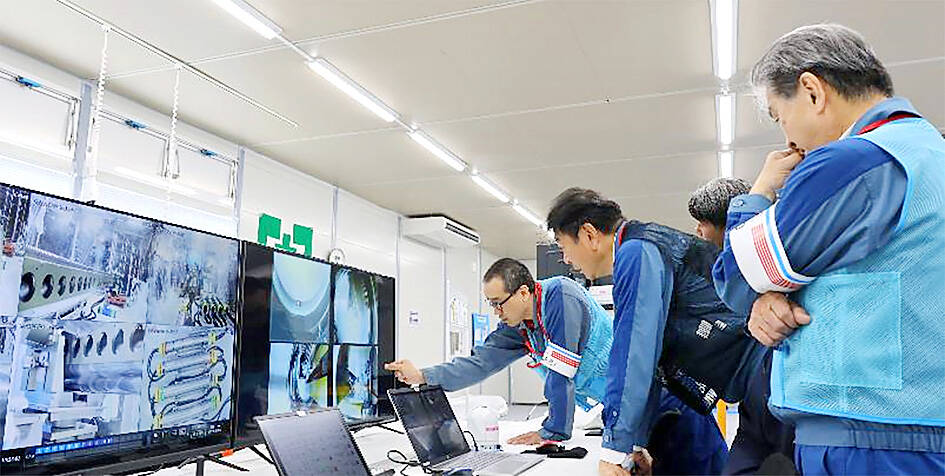A difficult operation to remove a small amount of radioactive debris from Japan’s stricken Fukushima Dai-ichi nuclear power plant began yesterday, after technical issues suspended an earlier attempt.
Tokyo Electric Power Co (TEPCO) in a statement said that its “pilot extraction operation” had started.
It would take about two weeks, the company said.

Photo: Tokyo Electric Power Co via AP
The tiny sample would be studied for clues about conditions inside the reactors — a crucial step toward decommissioning the nuclear power plant.
About 880 tonnes of extremely hazardous material remain 13 years after a tsunami caused by a magnitude 9.0 earthquake triggered one of the world’s worst nuclear accidents.
Removing the debris from the reactors is regarded as the most daunting challenge in the decades-long decommissioning project.
“The government would like to urge TEPCO to respond with an even higher sense of urgency as we enter the most difficult work phase, which will be the basis for decommissioning the plant,” Japanese Chief Cabinet Secretary Yoshimasa Hayashi told reporters yesterday.
TEPCO originally planned to start its first trial removal on Aug. 22, aiming to collect just 3g for analysis — if the extraction process was successful — but the company had to stop the work at a preliminary stage after detecting a problem involving the installation of the necessary equipment.
Three of the plant’s six reactors were operating when the tsunami hit on March 11, 2011, sending them into meltdown.
The debris within has radiation levels so high that TEPCO had to develop specialized robots able to function inside.
TEPCO deployed two mini-drones and a “snake-shaped robot” into one of the three nuclear reactors in February, as part of the preparations for the removal task.
Separately, last year Japan began releasing treated wastewater from the plant into the Pacific Ocean, sparking a diplomatic row with China and Russia. Both nations have banned Japanese seafood imports, although Tokyo insists the discharge is safe, a view backed by the UN atomic agency.
Meanwhile, in a TEPCO initiative to promote food from the Fukushima area, swanky London department store Harrods on Saturday began selling peaches that were grown in the region.
Fukushima peaches are renowned for their juicy, sweet taste — but they are not cheap, with one box of three reportedly going for £80 (US$105).

POLITICAL PRISONERS VS DEPORTEES: Venezuela’s prosecutor’s office slammed the call by El Salvador’s leader, accusing him of crimes against humanity Salvadoran President Nayib Bukele on Sunday proposed carrying out a prisoner swap with Venezuela, suggesting he would exchange Venezuelan deportees from the US his government has kept imprisoned for what he called “political prisoners” in Venezuela. In a post on X, directed at Venezuelan President Nicolas Maduro, Bukele listed off a number of family members of high-level opposition figures in Venezuela, journalists and activists detained during the South American government’s electoral crackdown last year. “The only reason they are imprisoned is for having opposed you and your electoral fraud,” he wrote to Maduro. “However, I want to propose a humanitarian agreement that

ECONOMIC WORRIES: The ruling PAP faces voters amid concerns that the city-state faces the possibility of a recession and job losses amid Washington’s tariffs Singapore yesterday finalized contestants for its general election on Saturday next week, with the ruling People’s Action Party (PAP) fielding 32 new candidates in the biggest refresh of the party that has ruled the city-state since independence in 1965. The move follows a pledge by Singaporean Prime Minister Lawrence Wong (黃循財), who took office last year and assumed the PAP leadership, to “bring in new blood, new ideas and new energy” to steer the country of 6 million people. His latest shake-up beats that of predecessors Lee Hsien Loong (李顯龍) and Goh Chok Tong (吳作棟), who replaced 24 and 11 politicians respectively

Young women standing idly around a park in Tokyo’s west suggest that a giant statue of Godzilla is not the only attraction for a record number of foreign tourists. Their faces lit by the cold glow of their phones, the women lining Okubo Park are evidence that sex tourism has developed as a dark flipside to the bustling Kabukicho nightlife district. Increasing numbers of foreign men are flocking to the area after seeing videos on social media. One of the women said that the area near Kabukicho, where Godzilla rumbles and belches smoke atop a cinema, has become a “real

‘WATER WARFARE’: A Pakistani official called India’s suspension of a 65-year-old treaty on the sharing of waters from the Indus River ‘a cowardly, illegal move’ Pakistan yesterday canceled visas for Indian nationals, closed its airspace for all Indian-owned or operated airlines, and suspended all trade with India, including to and from any third country. The retaliatory measures follow India’s decision to suspend visas for Pakistani nationals in the aftermath of a deadly attack by shooters in Kashmir that killed 26 people, mostly tourists. The rare attack on civilians shocked and outraged India and prompted calls for action against their country’s archenemy, Pakistan. New Delhi did not publicly produce evidence connecting the attack to its neighbor, but said it had “cross-border” links to Pakistan. Pakistan denied any connection to